

1879 Birth: Franz von Papen: German diplomat and politician, first with the Center Party, later an independent. The Penultimate Reich chancellor of the Weimar Republic (Cabinet of the Barons). Helped Hitler oust Reich Chancellor Schleicher. Scheduled to be eliminated during the Blood Purge, his life will be saved by an appeal to Goering. Under Hitler, Papen will become vice chancellor, then ambassador in Vienna, and afterwards in Ankara. Acquitted during Nuremberg trials. Later sentenced to eight years in labor camp by German authorities, released in 1949. Afterwards, unsuccessfully attempted to justify his role in the Nazi regime.
[See: Was Franz von Papen Really Innocent?]1889: Katsu Goto, a prominent merchant and interpreter, is lynched in Hawaii because of his advocacy on behalf of Japanese plantation workers. (Niiya)
From The United States Looking Outward, an 1890 magazine article by influential American military author and theorist, Rear Admiral Alfred T. Mahan:
I am not regretting that we have not the means to meet on terms of equality the great navies of the Old World. I recognize what few at least say, that, despite its great surplus revenue, this country is poor in proportion to its length of seaboard and its exposed points. That which I deplore, and which is a sober, just, and reasonable cause of deep national concern, is that the nation neither has nor cares to have its sea frontiers so defended, and its navy of such power, as shall suffice, with the advantages of our position, to weight seriously when inevitable discussions arise, such as we have recently had about Samoa and Bering Sea, and which may at any moment come up about the Caribbean Sea or the (Panama) canal.
Is the United States, for instance, prepared to allow Germany to acquire the Dutch stronghold of Curacao, fronting the Atlantic outlet of both the canals of Panama and Nicaragua? Is she prepared to acquiesce in any foreign power purchasing from Haiti a naval station on the Windward Passage, through which pass our steamer routes to the Isthmus? Would she acquiesce in a foreign protectorate over the Sandwich Islands (Hawaii), that great central station of the Pacific, equidistant from San Francisco, Samoa, and the Marquesas, and an important post on our lines of communication with both Australia and China? . . . .
The military needs of the Pacific (United) States, as well as their supreme importance to the whole country, are yet a matter of the future, but of a future so near that provision should begin immediately...First, protection of the chief harbors, by fortifications and coast-defense ships, which gives defensive strength, provides security to the community within, and supplies the bases necessary to all military operations. Secondly, naval force, the arm of offensive power, which alone enables a country to extend its influence outward. Thirdly, it should be an inviolable resolution of our national policy, that no foreign state should henceforth acquire a coaling position within three thousand miles of San Francisco, which includes the Hawaiian and Galapagos islands and the coast of Central America.
1897 Birth: Joseph Goebbels:

Joseph Goebbels was born in Rheydt, Germany, on 29th October, 1897. A good student, he won a Catholic scholarship and eventually achieved a PhD from Heidelberg University.
Goebbels was under five feet tall with a bad limp caused by a bone operation as a child and in 1914 was rejected by the German Army. It was later claimed that he spent the next two days crying hysterically in his room.
Goebbels spent the next ten years writing novels, plays and poems. When he failed to find a publisher for his work he developed the theory that this was because the publishing companies were owned by Jews. He was also rejected as a reporter by the newspaper Berliner Tageblatt.
Goebbels joined the National Socialist German Workers Party (NSDAP) in 1926. Goebbels described one of their first meetings with Adolf Hitler in his diary: "Shakes my hand. Like an old friend. And those big blue eyes. Like stars. He is glad to see me. I am in heaven. That man has everything to be king."
Hitler admired Goebbels' abilities as a writer and speaker. They shared an interest in propaganda and together they planned how the NSDAP would win the support of the German people. He edited Der Angriff (The Attack) and used the daily newspaper to promote the idea of German nationalism.
In 1928 Goebbels, Hermann Goering and ten other members of the Nazi Party were elected to the Reichstag. Soon afterwards Goebbels became the party's Propaganda Leader.
When Adolf Hitler became chancellor in January, 1933, he appointed Goebbels as Minister for Public Enlightenment and Propaganda. Goebbels was under five feet tall with a bad limp caused by a bone operation as a child. Congenital birth defects was a disqualification for high office and so he told people his limp was the result of a wound suffered while fighting in the First World War.
During the Second World War Goebbels played an important role in building up hatred for the allies. He had little confidence in the abilities of other ministers in the government and made attempts to have Joachim von Ribbentrop dismissed from office.
When the Red Army made advances into Nazi Germany, Hitler invited Goebbels and his family to move into his Fuehrerbunker. On 1st May, 1945, Joseph Goebbels, his wife and six children, committed suicide. (spartacus.schoolnet.co)
1914 World War I: Various:

There were few in the regiment as healthy or as full of stamina as Hitler. With unbelievable toughness he endured the greatest strains and never showed any weakness . . . . [The] battle-ordinance, to which Hitler also belonged, was far more exposed to enemy fire than the companies themselves, for while the latter could always find cover in the terrain, the ordinance staff were constantly on the move with messages; and I am amazed even today, how Adolf Hitler came through [the war] so fortunately."
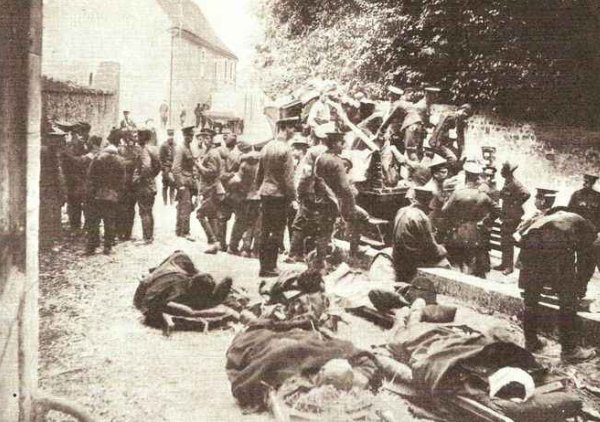
The losses grow under the violent fire that the enemy hurls toward the attackers from cannons and machine-guns. They lean, and fall down on their knees among the hedges, mown down by a burst of fire; but the yawning gaps are always filled again by fresh fighters. Our artillery's lack of ammunition is clearly noticeable; it can offer the attack no effective support.
Morning passes in tough, bloody stand-up fights. A horrifying battle-music&mdasha true concert from Hell&mdashfills the battlefield. The howls, hisses, crashes of the heavy shells of English naval cannons constantly bursting between the lines; the rolls of machine-gun salvos, and the clatter of infantry weapons; the fire rises from violent storms to raging assault, to eerie hurricane. Whole rows [of men] drop while pushing forward, crash back again, break in on themselves. Is it not mad to advance in this fire? And new waves push in, repeated hour after hour. The excitement is unproductive; all reserves are already used up. At last at 3 0'clock in the afternoon the enemy's key-point, the windmill—on the south-slope of the area from where so much [havoc] has been created—is brought under heavy fire by our artillery, is caught cleanly, and is shattered with a few direct hits.
For a moment, enemy fire falls silent. It is like a deep, eerie breathing-space. Then it breaks out with strengthening force: a single fire-spitting maw[Sic]: but on—must go on—forwards! Then, at the critical moment, the assault signal of the buglers is heard over the whole fighting front! Knapsacks are discarded; everyone pulls himself up: Bavarians, Saxons, Swabians, all closed together; there are no more stops; only forwards! A thousand-voiced "Hurrah" roars across the battlefield—a single violent victory cry—and, like a wild surf, the storm waves throw themselves at the village!--Gheluvelt is ours!
I could see nothing any more, and could no longer breathe for dust." Hearing cries of help coming from the chÂteau, Mend rushes forward, as a group of Saxons and "a few telegraph operators sprang immediately to the aid of the wounded. At once, one cried out: "The Bavarian colonel [List] is also dead!" In my horror, I left my horse unattended, and sprang to the side of Colonel List, now covered by a tent flap. I lifted this away and saw that blood welled from his mouth. [Our] brave commander, who was a true leader of his troops, was no more.
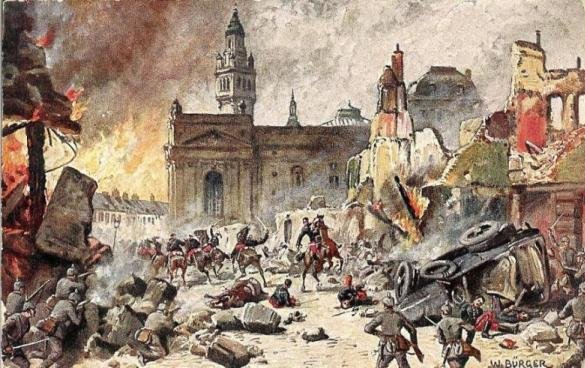
Only a few regiments have had to give such a heavy toll in blood in their first fight . . . . [After three days of fighting, the] proud List Regiment had melted down to the strength of a battalion . . . . [More than half of its officers had been killed, including] the brave regimental leader, Colonel List, felled by a direct hit in the furthest forward line.
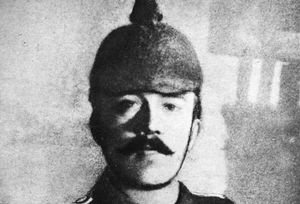
So we went on fighting for three days in the same way, and on the third day the British were finally defeated. On the fourth evening we marched back to Werwick. Only then did we know how many men we had lost. In four days, our regiment—having consisted of thirty-five hundred men—was reduced to six hundred. In the entire regiment, there remained only thirty officers. Four companies had to be disbanded. But we were all so proud of having defeated the British! Since that time, we have been continually in the front lines. I was proposed for the Iron Cross; the first time in Messines; then again at Wytschaete, by Lieutenant Colonel Engelhardt, who was our regimental commander. Four other soldiers were proposed for the Iron Cross at the same time. Finally, on December 2, I received the medal [EK2].
Turkey—encouraged by the Germans—declares war against the Allies, announcing its entrance into the war with a surprise bombardment of the Russian Black Sea coast.
In 1914 the Ottoman Empire contained an estimated 25 million people. Although there were 14 million Turks, there [were] also large Arab, Assyrians, Armenian, Kurdish, Greek and Circassion minorities within the Empire. As a result, there existed nationalist, separatist movements in several areas of the territory under the control of the Turks. The Turkish Army was made up of Anatolian Turks, Arabs, Armenians, Kurds and Syrians. The army performed badly.

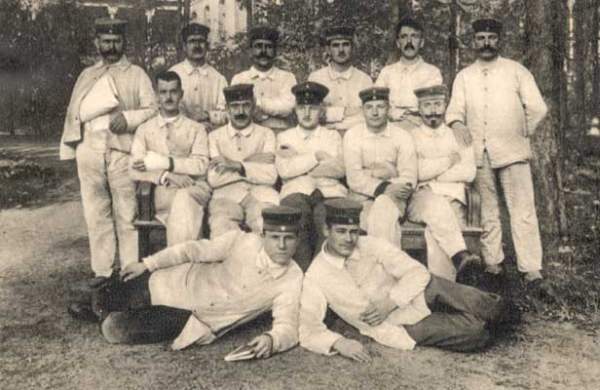
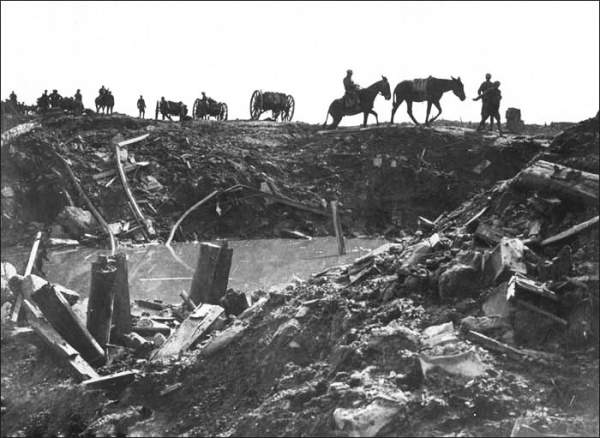
1918 World War I: Various: Count Detlef von Moltke on Kaiser Wilhelm II's Abdication:
I come now to the 29th of October, the day of the departure of the Emperor from Potsdam for Spa, the headquarters of the Army in the West. The journey was resolved upon by the General Staff at midday. The suddenness of it did not surprise us soldiers, accustomed as we were to quick movements. It aroused, however, speculation on the part of the public and was commented on from different angles by the press, on the 30th, some of the more radical newspapers even hinting, in guarded language, at flight. When we examine the reasons for the journey, we must not forget that the Emperor and King was not only Monarch but Commander-in-Chief of the Military Forces of the Empire. We must, therefore, ask ourselves what remained of the Imperial powers after the change to parliamentary government in the first days of the month? The answer is: almost nothing. The hypocritical Wilson had now brought it to pass among his Allies.
Mutiny: Sailors of the German High Seas Fleet seize control of their ships to prevent a final desperate suicide battle with the British Grand Fleet:
While the war-weary troops and the population disappointed by the Kaiser's government awaited the speedy end of the war, the German Naval Command in Kiel under Admiral Franz von Hipper planned to dispatch the fleet for a last battle against the Royal Navy without authorization. The naval order of 24 October 1918 and the preparations to sail first triggered a mutiny among the affected sailors and then a general revolution which was to sweep aside the monarchy within a few days. The mutinous sailors had no intention of being needlessly sacrificed in the last moment of the war. The sailors revolt started on the Schillig Roads off Wilhelmshaven, where the German fleet had anchored in expectation of a planned battle. During the night from 29 to 30 October 1918 some crews refused to obey orders. On board of three ships from the Third Navy Squadron sailors refused to lift anchor. On board of the battle ships from the First Navy Squadron SMS "Thüringen“ and "Helgoland" outright mutiny and sabotage occurred.
Cobbe's cavalry engages the Turks at Sharqat:
Hakki determined to retreat his army once it became clear that Cobbe's force was endangering his army's rear. Retreating therefore to Sharqat a further 100km to the north, he nevertheless came under attack by Cobbe on 29 October 1918. Within a day Hakki surrendered to Cobbe, despite the fact that his lines had yet to be breached by the combined Anglo-Indian force. However with the Ottoman Empire in disarray an armistice was both desirable and imminent, and was consequently agreed within a matter of days. [For further details, Click here.]
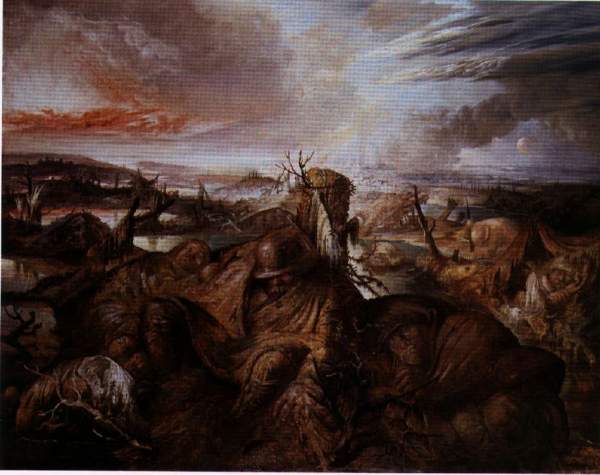
World War I (Oct 15 - Nov 10): Gefreiter Adolf Hitler, blinded in a gas attack near Werwick on Oct 14, recovers in the Prussian Reserve Hospital at Pasewalk near Berlin. The doctors at this army hospital, on the cutting edge of medical treatments for gassed soldiers, provide Hitler with very good care, and his sight slowly and painfully begins to return to him over these few weeks. Hitler falls into a deep depression. After over four years on the front lines, his fighting days are over. In four years of war, the List Regiment has lost 3,754 dead, 8,795 wounded, with 678 taken prisoner. This is somewhat above the average for the German Armed Forces as a whole.
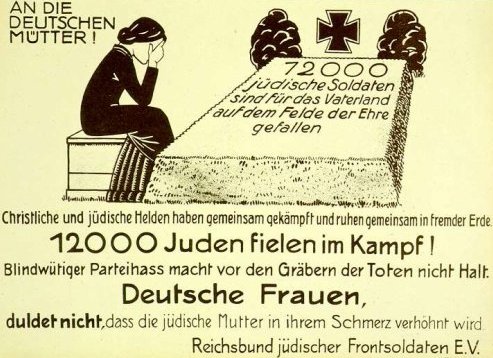
Throughout the length of the war, fifty-nine Jews served in the List Regiment, sixteen of these as officers. Thirty percent of the Jews in the List Regiment were honored for bravery, and seventeen percent were killed in action.[For further details, Click here.]
1929 Stock market crashes:
Black Tuesday hits Wall Street as investors trade 16,410,030 shares on the New York Stock Exchange in a single day. Billions of dollars were lost, wiping out thousands of investors, and stock tickers ran hours behind because the machinery could not handle the tremendous volume of trading. In the aftermath of Black Tuesday, America and the rest of the industrialized world spiraled downward into the Great Depression.
During the 1920s, the U.S. stock market underwent rapid expansion, reaching its peak in August 1929, a period of wild speculation. By then, production had already declined and unemployment had risen, leaving stocks in great excess of their real value. Among the other causes of the eventual market collapse were low wages, the proliferation of debt, a weak agriculture, and an excess of large bank loans that could not be liquidated.
Stock prices began to decline in September and early October 1929, and on October 18 the fall began. Panic set in, and on October 24—Black Thursday—a record 12,894,650 shares were traded. Investment companies and leading bankers attempted to stabilize the market by buying up great blocks of stock, producing a moderate rally on Friday. On Monday, however, the storm broke anew, and the market went into free fall. Black Monday was followed by Black Tuesday, in which stock prices collapsed completely.
After October 29, 1929, stock prices had nowhere to go but up, so there was considerable recovery during succeeding weeks. Overall, however, prices continued to drop as the United States slumped into the Great Depression, and by 1932 stocks were worth only about 20 percent of their value in the summer of 1929. The stock market crash of 1929 was not the sole cause of the Great Depression, but it did act to accelerate the global economic collapse of which it was also a symptom. By 1933, nearly half of America's banks had failed, and unemployment was approaching 15 million people, or 30 percent of the workforce. It would take World War II, and the massive level of armaments production taken on by the United States, to finally bring the country out of the Depression after a decade of suffering. (History.com)
1933 The Conference for Relief of German Jewry opens in London.
1940 World War II: Various: Crete:
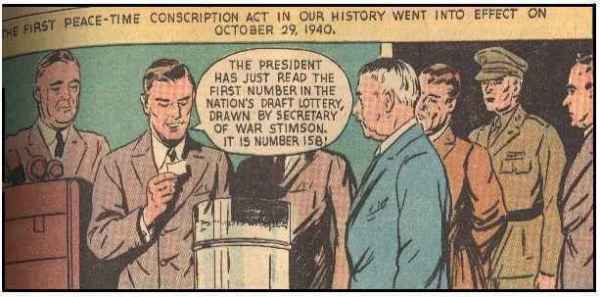
USA: Draft: Secretary of War, Henry L. Stimson, draws the first number, which is 158, in the first peacetime military draft in US history.
1941 World War II: Various: Barbarossa:
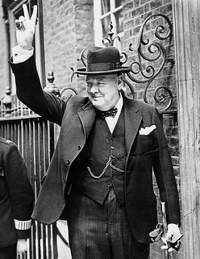
Churchill delivers a speech at Harrow School:
Almost a year has passed since I came down here at your Head Master's kind invitation in order to cheer myself and cheer the hearts of a few of my friends by singing some of our own songs. The ten months that have passed have seen very terrible catastrophic events in the world—ups and downs, misfortunes—but can anyone sitting here this afternoon, this October afternoon, not feel deeply thankful for what has happened in the time that has passed and for the very great improvement in the position of our country and of our home? Why, when I was here last time we were quite alone, desperately alone, and we had been so for five or six months. We were poorly armed. We are not so poorly armed today. [For further details, Click here.]
1942 The British protest against the persecution of Jews:
On this day in 1942, leading British clergymen and political figures hold a public meeting to register their outrage over the persecution of Jews by Nazi Germany.
In a message sent to the meeting, Prime Minister Winston Churchill summed up the sentiments of all present: "The systematic cruelties to which the Jewish people-men, women, and children-have been exposed under the Nazi regime are amongst the most terrible events of history, and place an indelible stain upon all who perpetrate and instigate them. Free men and women," Churchill continued, "denounce these vile crimes, and when this world struggle ends with the enthronement of human rights, racial persecution will be ended." [For further information, click here]
1944 World War II: Various: Netherlands:
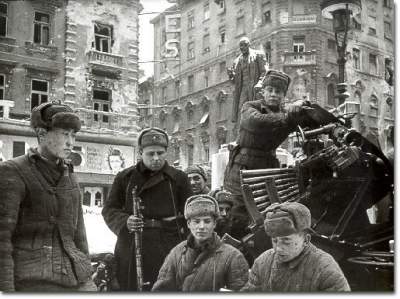
Hungary: the Red Army begins an offensive aimed at the capital, Budapest. Hungary remained very much an "unwilling satellite" of Germany. Hungary was attempting to quit the war and was seen by Germany as reluctant to take sufficient measures against the Jews. Germany needed Hungarian oil wells. [For further details, Click here.]
1956 Cold War: Israel invades Egypt; Suez Crisis begins: Israeli armed forces push into Egypt toward the Suez Canal, initiating the Suez Crisis. They would soon be joined by French and British forces, creating a serious Cold War problem in the Middle East. [For further information, click here]
1957: Memorandum From the Secretary of Defense (McElroy) to the Secretary of the Navy (Gates):
SUBJECT: Vanguard Program - Your memorandum of 22 October expressed concern that, the Presidential statement of 9 October on the U.S. satellite program, has committed the Navy to meet the December 1957 launching of a test vehicle, and a March 1958 launching of an instrumented satellite. Subsequent to the above, I have received a confirmation from the President that he expects the Department of Defense to meet these commitments.
At the time the U.S. satellite program responsibility was assigned to the Navy, the atmosphere of a completely scientific effort in the framework of the International Geophysical Year prevailed. The Soviets' success with their satellite has changed the situation. We now have the added burden of, not only launching a successful satellite but, doing it as per our current schedule. The psychological factors in this matter have obviously received a new emphasis. If necessary, a back-up program, to insure success, will be initiated. We must, therefore, go forward with deliberate speed in this program, and meet the above dates if at all possible. Requests for assistance to maintain this schedule should be called to the attention of the Assistant for Guided Missiles. We are attempting to obtain an additional launching stand for you.
1973 Klaus Barbie: Klaus Altmann, wanted in France for war crimes under the name of Klaus Barbie, is released after nearly eight months in a Bolivian jail:

In 1954 the French tried Barbie in absentia and convicted him of torture and murder. Meanwhile, Barbie had settled comfortably under an assumed name in Nazi-tolerant Bolivia. Living as "Klaus Altmann," Barbie eventually found work managing operations of Transmaritima Boliviana, an international shipping firm. He even made a couple of business trips to the US on behalf of TMB. Nobody from the US government ever bothered him.
He must have gotten pretty cocky by 1974, when he granted an interview to journalist Alfredo Serra in La Paz. When asked whether he was proud of his wartime activities, Barbie replied: "Of course I am proud of what I did during the war. If it hadn't been for me, France would be a Soviet Socialist Republic by now." Things got even more comfy for Barbie after he helped overthrow the Bolivian government. [For further details, Click here.]
1996 An auction of 8,000 Austrian Jewish artworks plundered by Adolf Hitler's Nazis in World War II takes place at the Vienna Museum for Applied Arts. Proceeds go to Austrian Jewish and non-Jewish victims of the Holocaust.
Edited by Levi Bookin (Copy editor) Click to join 3rdReichStudies Disclaimer: This site includes diverse and controversial materials--such as excerpts from the writings of racists and anti-Semites--so that its readers can learn the nature and extent of hate and anti-Semitic discourse. It is our sincere belief that only the informed citizen can prevail over the ignorance of Racialist "thought." Far from approving these writings, this site condemns racism in all of its forms and manifestations.
levi.bookin@gmail.com










Fair Use Notice: This site may contain copyrighted material the use of which has not always been specifically authorized by the copyright owner. We are making such material available in our efforts to advance understanding of historical, political, human rights, economic, democracy, scientific, environmental, and social justice issues, etc. We believe this constitutes a "fair use" of any such copyrighted material as provided for in section 107 of the US Copyright Law. In accordance with Title 17 U.S.C. Section 107, the material on this site is distributed without profit to those who have expressed a prior interest in receiving the included information for research and educational purposes. If you wish to use copyrighted material from this site for purposes of your own that go beyond 'fair use', you must obtain permission from the copyright owner.
Please Note: The list-owner and the moderator of 3rdReichStudies are not responsible for, and do not necessarily approve of, the random ads placed on our pages by our web server. They are the unfortunate price one pays for a 'free' website.



